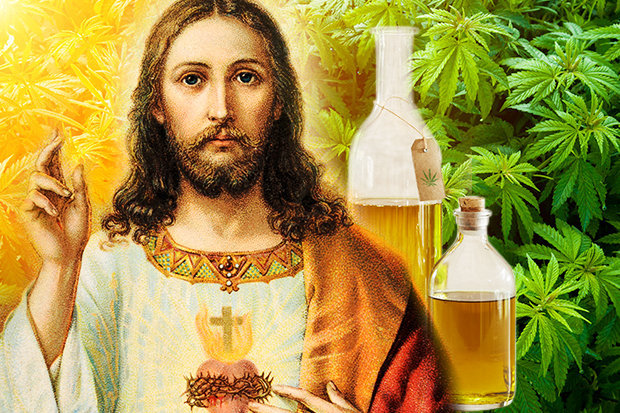(Editor’s Note: Please keep in mind that the researcher in this story is considered quite controversial. And there are many people who believe that Jesus was the son of God, God himself (the second person of the Trinity) and that quite frankly he didn’t need cannabis to do anything. However, that doesn’t negate the fact that he might have used it. Especially if you believe he made all things. Read, comment and share, but please keep it civil. Again, I’m posting to offer all sides of the argument. I’m not taking sides.)
According to a growing number of experts (many who are controversial), Jesus used cannabis and was an early champion of its medicinal properties and these experts believe that “acceptance of this theory could help promote the controversial drug’s use in treating a range of illnesses.”1
“Cannabis historian, author and journalist David Bienenstock is one who believes cannabis oil even explains the ‘miracles’ attributed to Jesus.
‘Historical records show that cannabis was widely available at the time – they would’ve known how to grow it and exploit its medicinal properties. There is nothing different in the efficacious cannabis oil used today that wouldn’t have been available to people in Jesus’ time – it’s simply a matter of concentrating the cannabis into the oil and absorbing it through the skin.”2
RELATED STORY:
Scholars like Bienenstock and Bennett also likely believe that Exodus 30: 22-25 points to a cannabis oil recipe for anointing (a process mentioned for the first time in the second book of the Bible or Torah, Exodus) but if you read it, there’s no mention of cannabis:
The Anointing Oil and Incense
22 The Lord said to Moses, 23 “Take the finest spices: of liquid myrrh 500 shekels, and of sweet-smelling cinnamon half as much, that is, 250, and 250 of aromatic cane, 24 and 500 of cassia, according to the shekel of the sanctuary, and a hin[a] of olive oil. 25 And you shall make of these a sacred anointing oil blended as by the perfumer; it shall be a holy anointing oil. Exodus 30:22-25 English Standard Version (ESV)
RELATED STORY:
They get their understanding from a Polish anthropologist called Sula Benet who argued that “equating Keneh Bosem with sweet cane could be traced to a mistranslation in the Septuagint (the earliest Old Testament translation), which mistook Keneh Bosem, later referred to as “cannabos” in the Talmud (Judaism’s Oral Torah), as “kalabos”, a common Egyptian marsh cane plant.”3
But again, still, others disagree.
Timothy J. Binder, MDiv (Western Seminary in Portland, Oregon) says about the topic:
“There are some who see Exodus 30:23 as a direct reference to marijuana. They cite Sula Benet, an etymologist from Poland who concluded in 1936 that the Hebrew words “q’nah-bosem” found at Exodus 30:23 were etymologically related to “cannabis” and then reached the further conclusion that the anointing oil included marijuana. She noted the similarities with words from other Middle Eastern language groups. She noted that the word could be used to reference a reed plant or a hemp plant, but she reached the definite conclusion that in the Exodus passage it meant the hemp plant. (I realize this was not the main point of her treatise, but it is the point that most impacts the present debate.) Others have stated that the Hebrew University supports this view, although no one apparently has been able to come up with a definitive source at that university for this statement. If you check out the Wikipedia article on cannabis (etymology), Raphael Mechoulam of the Hebrew University suggests a different etymology for the word “cannabis.” [Please note that people differ on the way to transliterate the relevant Hebrew words (to show the Hebrew word using English characters). I use “q’nah-bosem” for the passage in Exodus (the only place where the basic Hebrew word “qaneh” appears with the Hebrew word “bosem”) and “qaneh” elsewhere. Some might use “kaneh” or other transliterations. The underlying Hebrew word “qof,” “nun,” “hey” (the three letters of the Hebrew alphabet used for “qaneh”) remains the same.]
In my view Dr. Benet’s evidence falls far short of proving the conclusion that “q’nah-bosem” was marijuana. The problem with her conclusion is at least seven-fold. First, there are no clear references that I have been able to find to cannabis in ancient Hebrew before the time of the Mishnah. The word “qaneh” is not associated with traditional aspects of hemp, either as rope, medicinal use, food use, or narcotic use in any of the ancient Hebrew texts, at least that I can find. Given this paucity of evidence, I do not think that anyone is able to reach a definite conclusion that the Hebrew word “q’nah-bosem” was a reference to cannabis.”4
While there is much we don’t know and while we might not all agree on everything, scripture fails to mention loads and loads of plants that are good and beneficial so it’s certainly possible! In fact, there would be no reason for Jesus not to have used cannabis. It’s a miracle plant after all.
RELATED STORY:
We do know that the Yamnaya people, who ventured out of Central Asia about 5000 years ago and left their genes in most living Europeans and South Asians, appear to have carried cannabis to Europe and the Middle East. We aren’t sure if they used it simply to make hemp for rope or also smoked or ingested it but we do know that some ancient people did inhale; digs in the Caucasus’, uncovered “braziers containing seeds and charred remains of cannabis dating to about 3000 B.C.”5












